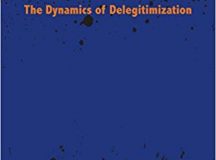Correction: In an earlier version of this article, the authors claimed that Sir Stephen Sedley, writing in the London Review of Books, defined antisemitism as ‘hatred of Jews as Jews’. This was incorrect. In fact, Sir Stephen defined antisemitism as ‘hostility to Jews as Jews’. The editors regret this error, apologise to Sir Stephen, acknowledge there is a real difference between the two words, and have amended the article accordingly.
In this essay the philosopher Bernard Harrison and the academic lawyer Lesley Klaff seek to demolish the two main criticisms of the International Holocaust Remembrance Alliance (IHRA) Definition of Antisemitism: that it is useless as a legal tool and illegitimately restricts freedom of speech. By drawing out the critical distinction between antisemitism as an emotional disposition – ‘hatred of Jews as Jews’– and antisemitism as a delusive pseudo-explanatory political theory based on fear, a form of defamation ‘designed to explain why national or world politics are failing to move in ways congenial to the antisemite and his friends’, the authors successfully show that that which the Definition characterises as antisemitic is indeed so, and that ample means already exist in British statute law for giving legal effect to the clarifications it offers, not least the Public Order Act 1986 and The Equality Act 2010. They show that the mistake made by critics of the Definition such as Sir Stephen Sedley is to think that a subjective, intentional ‘hostility towards Jews as Jews’ is all that the term antisemitism can mean, an impoverished and ahistorical reduction of the phenomena of antisemitism that the Definition precisely, and to its credit, avoids.
The ‘IHRA Definition of Antisemitism’ is frequently cited in current political debate as the key to recognising and combating antisemitism.[i] But it has also been widely criticised, on two main grounds: the first, that it is useless as a legal tool; the second, that it illegitimately restricts freedom of speech.
The second of these criticisms is the fundamental one, on which the case for the first depends. It is that the Definition illegitimately conflates antisemitism and political criticism of Israel. Critics who pursue this line argue that antisemitism is best defined – in the phrase of Sir Stephen Sedley, writing recently in the London Review of Books[ii]– as ‘hostility towards Jews as Jews’.
If that is what antisemitism is – and all it is – then it would appear to follow that no criticism of Israel, however ‘hostile’ or ‘extreme’, can be antisemitic. For criticism of Israel, even ‘hostility’ towards Israel, is criticism directed not towards ‘Jews as Jews’ but towards a political entity: a state. The IHRA Definition, however, expressly characterises certain criticisms of Israel (describing it as a Nazi state, or denying the right of the Jewish people to political self-determination, for instance), as antisemitic. Hence, so the argument goes, the IHRA Definition represents (perhaps not in intention but in effect) an attempt to restrict political debate by stigmatising certain political views as racist, when the views in question can in logic be nothing of the kind.
The first line of criticism that we mentioned above follows very simply from the success – if it succeeds – of the second one. The IHRA Definition consists of two main parts: first, a preamble, which offers a general characterisation of antisemitism, and second, a series of eleven putative ‘examples’, or instances, of antisemitic speech or conduct. The brief characterisation of antisemitism offered in the preamble reads in part, ‘Antisemitism is a certain perception of Jews, which may be expressed as hatred toward Jews.’ Legal critics[iii] have argued that this characterisation must necessarily constrain the legal interpretation of the ‘examples’ which occupy the bulk of the remaining text of the Definition. The wording of the preamble in their view must entail the legal consequence that nothing can be considered antisemitic unless it can be shown to manifest ‘hatred towards Jews as Jews’. Thus, claiming that Israel is a Nazi state, or that Jews are more loyal to Israel than to their countries of citizenship, could be shown to be antisemitic, by the terms of the IHRA Definition, only if it such claims could be shown to arise from hatred towards Jews in general on the part of those making them.
If this criticism stands, what it shows is that, legally speaking, the utility of the IHRA Definition is vitiated by a requirement to prove intent (in this case, intent to express hatred of Jews in general). Such requirements are in practice very difficult to meet and, indeed, make it difficult to devise legal restraints, not merely upon antisemitic speech and action, but upon racist speech and action of any kind. It was for this very reason that the MacPherson Report 1999, which reported on the racist killing of teenager Stephen Lawrence in 1993, emphasised ‘outcomes’ rather than ‘intention’.
These arguments no doubt seem powerful enough at first sight. But they depend for their validity on a single premise: that antisemitism is ‘hostility towards Jews as Jews’ – and is never anything else but that.
That premise is highly contestable. In effect it identifies antisemitism as a mental state: an emotional disposition to feel hostility towards any Jew merely because he or she is a Jew. Certainly that is one of the things covered by the term ‘antisemitism’. But is it the only thing covered by that term? We also use the word, surely, to describe something altogether different in nature – not a mental disposition at all, in fact but, rather, a cultural artefact: a body of pseudo-explanatory political theory. Antisemitism as a political theory is designed to explain why national or world politics are failing to move in ways congenial to the antisemite and his friends. That failure (whatever form it may take, in the minds of this or that group of antisemites) is, according to the theory, the fault of the Jews, a people united in the pursuit of evil, who secretly control the world, and whose vast powers of conspiratorial organisation have allowed them to take control of institutions – the banks, Hollywood, International Finance, the State Department, the US Presidency, &c. – which, though they may appear to be reassuringly Gentile to the core, are in reality entirely Jewish concerns, secretly managed from behind the scenes, entirely for the benefit of the Chosen People.
Whereas antisemitism as an emotional disposition is rooted in contempt, antisemitism as a political doctrine is rooted in fear, not to say panic. It is this kind of antisemitism that led, in the hands of the Nazis, to the mass extermination of the bulk of European Jewry between 1933 and 1945. One does not commit vast resources of manpower and militarily valuable material to the murder of extraordinary numbers of civilians – many of them one’s own fellow-citizens and the vast majority of them of no political significance whatsoever – because one happens to despise them. One does it because one fears them; regards them as constituting a serious, collectively motivated enemy force, albeit one working in secret, and disposing, through its quasi-demonic powers, of modes of operation beyond the power of the simple Gentile mind to unravel.
That all of this is nonsense is evident merely from its content. Jews – of all people – are certainly not up to running the World Conspiracy attributed to them by the night terrors of the political antisemite. But nobody could be ‘up to’ such a thing. ‘The world’ is simply too big, to complex, too diverse, to be ‘run from behind the scenes’ by anyone. The world we live in is no doubt, at all times and in many ways, a mess. But there is nothing ‘behind’ that mess; and if you want to know who is ‘responsible’ for it, go look in the mirror.
Nonsense as it is, however, political antisemitism has demonstrated its profound attractions for minds attuned to conspiracy theory by repeatedly reinventing itself as a strand in European politics over the past two millennia. In this process it has shown itself as attractive to minds of that type on the left of politics as to their homologues on the right. Most recently it has resurfaced, in connection with Israel, as a way of ‘making sense’ of the strained relationship between the West and the Islamic world. From the standpoint of many minds on the left and centre-left of Western politics, these strains are entirely the fault of the Jews, and originate in the foundation of the State of Israel. It is commonplace for people who would like to believe that without the presence of Israel in the region all would be sweetness and light between the Islamic world and the West, to commit themselves to the view that Israel is in some sense an ‘illegitimate state’, which should never have been allowed to come into existence in the first place. Once on the table, such a claim requires reasons to back it up. The easiest and most obvious way of backing up the contention that Israel – alone among the nation-states of the world – has no right to exist as a state is to claim that its conduct as a state outdoes in evil that of any other state in the world. Given the remarkable levels of evildoing achieved by a wide range of twentieth and twenty-first century regimes, from the Third Reich in Germany to the Pol Pot regime in Cambodia, or more recently the Assad regime in Syria, a detailed case for putting Israel, of all countries, at the head of the list would be difficult to assemble. Rather than making out a detailed case, therefore, those anxious to brand Israel as a ‘pariah state’ tend to choose the easier option of attempting to associate it as widely as possible, in suitably receptive minds, with things alreadywidely considered to represent the nadir of evil. Such things include Nazism, the Apartheid regime in South Africa, racism, colonialism and war. Hence the frequently-heard claims that Israel is a ‘Nazi State,’ a ‘racist state,’ an ‘Apartheid state,’ or a ‘colonial-settler state,’ or that it is ‘the main threat to peace’ in the region, or possibly in the world.
These more specific claims, however, cut no nearer the truth than the more general claim they attempt to substantiate, that Israel is an illegitimate state. Considered as a candidate for any of these descriptions, Israel falls at the first hurdle. Israel is not a ‘Nazi state,’ because its government (unlike that of the late Saddam Hussein in Iraq, for instance, or for that matter that of Bashar al-Assad in Syria) is not in the hands of a single political party obedient to an inspired leader and committed to enforcing policies in broad alignment with those of the former Nationalsozialistische Deutsche Arbeiterpartei. It is not an ‘Apartheid state’ because it altogether lacks the legal and social apparatus of racial separation that characterised the Apartheid regime in South Africa. It is not a ‘racist state’ because its Jewish population embraces Jews of all racial origins and colours, and for that matter because its citizens are only about 70 per cent Jewish, the remainder being Arab, including Muslim and Christian, Druze, Circassian and others. There are Arab Israeli Members of the Knesset and Arab Ministers of Government, as well as Arab Israeli Supreme Court Justices. Many Druze, some Christian Arabs and a few Muslims choose to serve in the IDF. It is not a ‘colonial-settler state’ because it did not come into being as a result of any European project of colonialism, but as the result of the Jewish population of Palestine establishing its right to political autonomy in the face of an attempt, from which the European powers stood aloof, to exterminate it or drive it from the land by military force. It has manifestly proved in practice a far lesser threat to peace, even in the region, than great-power rivalries between Iran, Turkey and Saudi Arabia, or for that matter, than the so-called Arab Spring.
These accusations, in short, make no contribution to serious political debate. Rather, they are sonorous but empty phrases, good only for hurling during demonstrations or the rowdier kind of meeting. Moreover, they clearly reanimate central elements of the type of antisemitism that takes the form of a pseudo-explanatory political theory; notably the thesis that the collective goals of the Jewish community are both profoundly evil and profoundly inimical to non-Jewish interests.
The factual baselessness of the above claims, that Israel is a ‘Nazi state’, a ‘racist state’, and so on, evidently vitiates their claim to articulate ‘political criticism’ of Israel deserving the protection of the law guaranteeing political freedom of speech. In the absence of serious factual grounding, ‘anti-Zionist’ slogan-mongering of this type lapses from the category of political discourse into that of politically motivated defamation. It is defamatory in the strict legal sense of falsehoods calculated to undermine the reputation of the victim and to expose him or her to hatred and contempt: the ‘victim’ in this case being any Jew (or for that matter non-Jew) supportive of Israel who finds herself or himself publicly labelled, with consequences ranging from reputational damage to risk of personal assault, as a putative supporter of Nazism, racism, colonialism, Apartheid and war.
If we now examine the claims concerning Israel characterised as antisemitic by the IHRA Definition, we find that they correspond very closely to those we have just identified as defamatory. The list of things identified as prima facieantisemitic by the Definition via its ‘examples’ is in fact a very short one: denying the right of the Jewish people to exercise political autonomy; describing Israel as an essentially racist or Nazi state; asserting the existence of a Jewish Conspiracy; asserting support for Israel on the part of non-Israeli Jews to argue disloyalty to their actual nations of citizenship; and the singling out of Israel for condemnation in respect of conduct passed over or condoned in other nations. These are all contemporary versions of claims regarding Jews central to political antisemitism of the type disseminated by the Nazis: antisemitism manifesting itself in the form of a delusive pseudo-explanatory political theory.
That would seem to set the second ground of criticism of the Definition in a rather less flattering light. It would appear that the ‘examples’ section of the Definition in no way restricts critical political debate concerning Israel; it merely restricts, by characterising them correctly as antisemitic, certain lines of mendacious defamation, primarily of Israel, and secondarily of its supporters, Jewish and non-Jewish.
In the light of that conclusion, what are we to say about criticism one, that the IHRA Definition is useless as a legal tool? The main ground of this objection, according to the two recent opinions by British QCs cited earlier, is that given the supposed constraint over the legal interpretation of the eleven ‘examples’ exercised by the sentence of the preamble earlier noted that ‘Antisemitism is a certain perception of Jews, which may be expressed as hatred toward Jews’, acts stigmatised as antisemitic in the examples could be so regarded in law only if they could in addition be shown to express hatred of Jews in general. It is true that the Definition in its present form does not distinguish explicitly between antisemitism as an emotional disposition and antisemitism as a delusive pseudo-explanatory theory. But at certain points it certainly presumes the validity of that distinction. In the passage of further elucidation immediately following the preamble, for example, we find the following: ‘Antisemitism frequently charges Jews with conspiring to harm humanity, and it is often used to blame Jews for ‘why things go wrong’‘. This is a sentence that efficiently captures in outline the main contentions of antisemitism in its mode as a body of delusive political theory.
In any case, once the (fairly evident) distinction between the two types of antisemitism is above the table, it seems clear, for the reasons offered above, that what is morally and legally objectionable about the claims regarding Israel characterised as antisemitic in the ‘examples’ section of the Definition, is not that they offer instances of ‘hatred of Jews as Jews,’ but rather that they offer instances of defamation. This changes the legal landscape in two important respects. Firstly, in proving a charge of defamation there is no need to prove intent. A defamatory statement regarding X, whether X is an individual or a collectivity, may be published without any intention of harming X, but is not rendered any the less defamatory by that fact. By the same token the publication of an antisemitic and defamatory false statement by someone innocent of ‘hatred of Jews as Jews’ does not cease to be antisemitic in virtue of that fact. The antisemitism here resides not in the intention but in the content of the act. And finally, returning briefly to the ground of criticism two, there is no freedom of expression defense to a charge of defamation.
The second change to the legal landscape introduced by placing defamation, rather than simply the expression of hatred, at the heart of antisemitic discourse, is that abundant resources already exist in British law for prosecuting the circulation of statements likely to attract hatred towards, or provoke actual assaults against, minority groups. Part III of the Public Order Act 1986 , for instance, criminalises acts involving ‘words,’ ‘behaviour,’ or ‘material’ of a ‘threatening, abusive or insulting character,’ that are merely likely, given all the circumstances, to stir up racial hatred. No freedom of expression defense is available in such cases.
The Equality Act of 2010 similarly proscribes antisemitic acts of the sort stigmatised as such by the IHRA Definition, in virtue of its recognition that the word ‘Jewish’ refers to ‘a race,’ ‘a religion,’ or ‘belief.’ The Act protects Jews and others from ‘hostile environmental harassment.’ Section 26 defines ‘harassment’ in a way that does not require ‘intent’. It provides that ‘a person A harasses another B if (a) he engages in unwanted conduct relative to a protected characteristic, and (b) the conduct has the purpose or effect [our italics] of (i) violating B’s dignity, or (ii) creating an intimidating, hostile, degrading, humiliating or offensive environment for B.’ Where such harassment is found to occur, there is no freedom of expression defense.
Online antisemitism, which the recent political storm over Brexit culminating in the General Election has revealed to be both menacing and endemic, may be actionable under both the Malicious Communications Act 1988 and the Communications Act 2003. The former makes it an offense to send indecent, grossly offensive, threatening or false [our italics] electronic communications, if the purpose (or one of the purposes) of the sender is to cause the recipient distress or anxiety. The latter criminalises use of a public electronic communications network to send a message (or other matter) that is grossly offensive or of an indecent, obscene or menacing character; or to send a false message ‘for the purpose of causing annoyance, inconvenience or needless anxiety to another.’ Again, where such an offense takes place, there is no freedom of expression defense.
It seems, then, that criticism one treads on ice as thin and as infirm as that trodden by criticism two. The IHRA Definition was not designed as a legal instrument, and in no jurisdiction has it been adopted in that role. It remains what it was designed to be: a means of clarifying, for the benefit of governments and administrators at all levels, what kinds of activity are to be considered antisemitic and why. It is possible – but that is a longer story – that some kinds of antisemitism are not caught by the Definition. But there seems little doubt, for the reasons offered above, that what it does characterise as antisemitic is indeed so. And there seems little doubt, either, that ample means already exist in British statute law for giving legal effect to the clarifications it offers.
[i] This paper offers a brief summary of the argument of a much longer and more detailed essay, ‘The IHRA Definition and its Critics,’ presented to the March 23-27, 2019 conference of the University of Indiana Institute for the Study of Contemporary Antisemitism, Contending with Antisemitism in a Rapidly Changing Political Climate, and scheduled to appear in a volume of conference proceedings under that title from Indiana University Press, to be published in 2021. The authors are, respectively, a non-Jewish philosopher and a Jewish academic lawyer.
[ii] Sir Stephen Sedley, ‘Defining Anti-Semitism,’ London Review of Books, 37 (2017):9,8
[iii] ‘In the Matter of the Adoption and Potential Application of the International Holocaust Remembrance Alliance Working Definition of Anti-Semitism’: Opinion by Hugh Tomlinson QC. Available in full at feeespeechonisrael.org/ihra-opinion; Geoffrey Robertson QC, ‘Anti-Semitism: The IHRA Definition and Its Consequences for Freedom of Expression.’ The full text is available at doughtystreet.co.uk.






































This seems to be very legalistic, and evades the central issues of antisemitism, such as its content, its origins, and its moral status. I will keep this brief, because the authors, and most Jews, would rather not enter into debate with antisemites. Nevertheless there is a political process at work here, which in theory can be recognised by both sides. A definition which is too narrow will offer little protection in practice, but a definition which is too broad will label most non-Jews as antisemites, and thus alienate them. What’s more, it will tend to normalise antisemitism, by making it ‘normal’ in the statistical sense. We should see the debate about the IHRA definition in this light.
The simple answer to this dilemma, is to adopt rational definitions grounded in history, politics, and sociology. However, that necessarily implies the abandonment of the image of antisemitism as a pathology, which in turn is also a form of normalisation.
I look forward to reading the extended essay upon publication. These posts by me critiquing the legal opinions you refer to may be of interest to the authors:
http://hurryupharry.net/2018/08/01/nec-antisemitism-code-ihra-ibergezetst-un-farbesert/
http://hurryupharry.net/2018/09/21/ihra-the-last-word-is-not-stern/